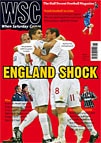 The experiment of using additional officials in the Europa League does not appear to be working
The experiment of using additional officials in the Europa League does not appear to be working
This season’s Europa League matches have generated more media interest than is usually given to Europe’s secondary club competition but it has nothing to do with the new league format and silly name change. The games are being watched with keen interest because they involve two extra officials stationed behind the goals.
UEFA president Michel Platini’s advance enthusiasm for the scheme suggests that it will be pronounced a success and swiftly introduced across Europe. “I am sure it will happen,” Platini said back in February after a meeting of football’s rule-making body the International FA board. “The decision will be made in 2011 so if it’s agreed then it will be used in Euro 2012.”
The goal-line gawpers communicate by radio but the referee still has to decide whether to act on their advice. In a sense the plan is a refinement of a process that has been enacted at most football matches for more than a century. There are already several hundred experts behind each goal who have clear views of every incident which they are quite prepared to communicate. It’s likely that some of their attention will now be turned towards the man standing in front of them, and in some cases obscuring their view, rather than the man on the pitch with the whistle.
Platini seems to believe that the presence of extra officials will discourage simulation, the blight on the modern game that produces anguished headlines on an almost daily basis. The depth of UEFA’s concern about this issue was demonstrated when they rushed to ban Eduardo for diving to win a penalty in a Champions League qualifier in September – before rescinding the punishment after an appeal. UEFA ought not to have caved in to pressure over the Eduardo case in the first place but wise heads prevailed nevertheless because the precedent set would have led to chaos.
Every penalty awarded would be subject to even more minute scrutiny than it currently receives, with daily demands for players to be fined, banned, tagged and, eventually, tarred and feathered, while referees would be thoroughly undermined by having major decisions reassessed.
Platini has even used referees’ supposed fallibility to justify the use of extra officials, saying: “For years players have cheated because the referees were not of good enough quality… with the extra officials close by they will take the right decisions.” In one of the two matches involving English clubs in the first week of the Europa League, Everton v AEK Athens, the extra officials played no part in two of the main decisions made by the referee. In the 70th minute the referee chose not to award a penalty for a trip
on Leighton Baines, and then sent off Louis Saha in injury time for a clash with AEK’s Juanfran who blatantly overacted with the intention of getting his opponent dismissed.
The latter incident was precisely the sort of thing that these extra advisors are supposed to watch for but either the referee decided not to consult them or they had no advice to offer. Platini has suggested that the next place to try out the idea will need to be a “top league with atmosphere and TV cameras such as England’s Championship”, which will at least provide two more people for Neil Warnock to square up to.
Warnock was among the managers to criticise the use of extra officials, while claiming that they might at least have spotted the biggest mistake that any referee is likely to make this season – the goal not given to Palace against Bristol City in August when Freddie Sears’s shot hit the stanchion at the back of the net and bounced out. The outcry over that incident led to renewed calls for the introduction of goal-line technology, something which the international football authorities are determined to resist largely on the basis that it can’t be applied at all levels of the game. The extra officials are an alternative solution to the problems that some think would be settled by electronic gadgetry but the effect is to further erode the authority of the referee.
The match officials are excoriated now because, as aggrieved managers never tire of pointing out, mistakes cost money. The loss of income that results from a wrong decision hasn’t yet been represented as an algebraic formula but it would be fair to assume that teams of statisticians are working towards it in thinktanks funded by the wealthiest European clubs. In the meantime there seems little point in entertaining the hope that football administrators will one day be of “good enough quality” to not want to fiddle about with the laws for the benefit of the privileged few.
From WSC 273 November 2009